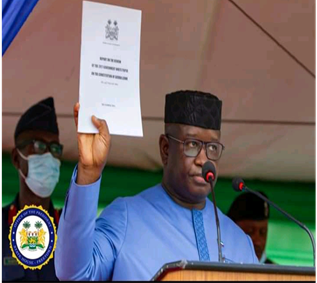By Amara Thoronka
In Sierra Leone, the Office of the Attorney General and Minister of Justice has been disintegrated into two. The Attorney General is no more the Minister of Justice.
The disclosure was made by the country’s President Julius Maada Bio on Thursday 13 January when launching the Government White Paper (government’s position) on the report of the said constitutional review committee (CRC) which was established by erstwhile president Ernest Bai Koroma who reportedly put out a white paper which did not reflect the recommendations of the then Justice Edmond Cowan’s constitutional review committee.
The current government of former army general, Julius Maada Bio, is said to have done some justice to the CRC report whose process cost the country thousands of dollars.
“Government accepts the recommendation to separate the office of the Attorney-General and Minister of Justice. The Attorney-General shall be the principal legal adviser to the Government but not a Minister. And that where a Minister of Justice is appointed, he or she shall have a seat in the Cabinet. The Government further proposes that the age for qualification for appointment as Attorney-General be reduced from twenty years to fifteen years and be subject to Parliamentary approval,” the white paper states.
The White Paper further states that people who are unlawfully arrested will either be compensated or be given a public apology. This move is believed to caution law enforcement agencies, particularly the Sierra Leone Police, to professionally adhere to and respect the fundament human right of people against unlawful and arbitrary arrest.
Also on human rights, state of emergency no longer prevents the exercise of certain rights.
“Government accepts the recommendation to add a new paragraph to section 29(6) stating in clear terms that the right to life, the prohibition of torture, the principles of legality, and the freedom of thought, conscience and religion shall not be derogated from during a State of emergency.”
The life span of a state of emergency has also been reduced from one year to six months.
On the existing controversy of citizenship acquisition and the involvement of dual citizens in national politics, the White Paper points out that government is committed to addressing such once and for all.
“The revised Constitution would contain a chapter on citizenship detailing how citizenship can be acquired (by birth, naturalization, marriage or adoption) as well as addressing concerns over dual citizenship with relevant safeguards to protect issues of national loyalty arising from dual citizenship and the circumstances in which it may be revoked.”
These adjustments among others are believed to settle many controversies that have been arising from the gray areas of the current 1991 Constitution of Sierra Leone.




